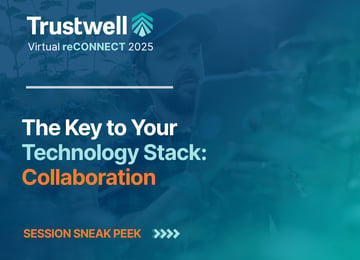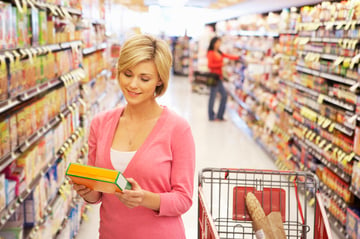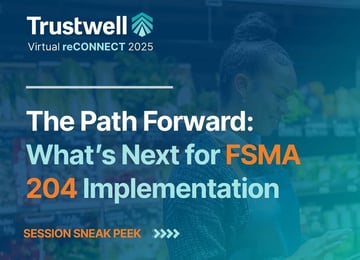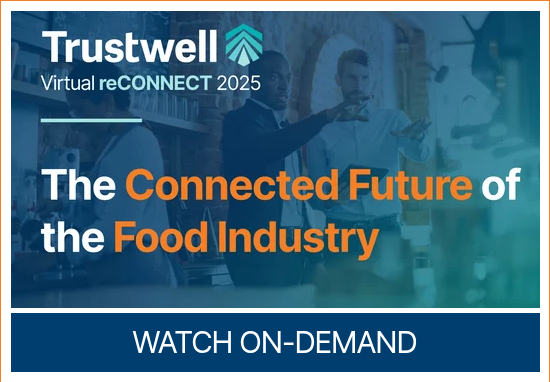For eight years our annual reCONNECT event has brought together professionals from across the food industry — including food safety leaders, regulatory experts, technology innovators, and brand operators — to discuss topics about food safety, traceability, and supply chain transparency. Our attendees and speakers log on from all over the country and globe to engage in thought leadership, share ideas, and connect with one another.
This year, we set out to explore what it really means to build a connected food supply chain in 2025 and beyond, and chose our topic: The Connected Future of the Food Industry. We wanted to know: what does it take to connect data and insights to food safety or supply chain transparency and more?
Industry leaders, regulatory voices, and food safety professionals from across the supply chain answered the call. Over the course of reCONNECT 2025, we heard how connection across systems, teams, technology, and partners is shaping the future of the food industry.
From real-time traceability and supplier transparency to digital transformation and cultural alignment, this year’s event revealed how forward-thinking organizations are preparing for what’s next. Over and over again, the message was clear: the future is connected.
Digital Download: Future-Focused Food Tech Trends & Buyer's Guide
If you missed the live event, it's not too late!. Every session is now available on demand, and we've compiled a list of the event's top takeaways to show you why you’ll want to explore reCONNECT 2025: The Connected Future of the Food Industry.
Food Traceability is a Strategic Advantage with Longterm Impact
With the FSMA 204 deadline now extended to 2028, there’s been a shift in how companies are approaching food traceability. Rather than viewing it solely as a regulatory hurdle, more organizations are treating it as a strategic investment. During multiple sessions, we heard from brands that are using traceability data to reduce risk, improve supplier performance, and make faster, more confident decisions across their operations.

Trustwell CEO Katy Jones put it plainly when she kicked off reCONNECT 2025 with her CEO's Address: "Our work is not abstract. It directly affects everyone, and food safety is about people. It's about families like mine and like yours who depend on accurate information to make the safest, best choice in what you're eating."
This takeaway was echoed in Global Sourcing Meets Traceability: How to Build Resilience from the Ground Up, which featured insights from Fresh Del Monte's VP of Corporate R&D and Food Safety Takashi Nakamura about how traceability has a significant role to play in the management of supply chain complexities on a global scale, and that it will only play a larger one in the years to come.
On-Demand Webinar: How FSMA 204 is Reshaping Complex, Global Supply Chains with Fresh Del Monte
"It's not inconceivable to see in the next five, ten years somebody being able to scan a UPC code and see very quickly where it was harvested, where it was processed, some of the key information like that in seconds," he predicted.

FSMA 204 Readiness Starts Now (Because Risk Doesn’t Wait)
Our VP of Supply Chain Strategy & Insights, Julie McGill, made it clear that while the compliance deadline has moved, the risks have not in The Path Forward: What's Next for FSMA 204, where she discussed key aspects of the final traceability rule. Food companies still face recalls, contamination, and supply chain volatility every day, and it's clear that the brands that act now are the ones building long-term resilience that will set them ahead of competitors later.
Digital Download: The Ultimate Guide to FSMA 204 Compliance
She cautioned against missing an opportunity to leverage this additional time, saying: "If you are not actively educating teams, working with internal teams, and external partners, depending on how many products you manage and what your role is in the supply chain, you may not be ready by 2028 even with this extension."

This theme was also reflected in Global Sourcing Meets Traceability: How to Build Resilience from the Ground Up with Takashi Nakamura. He shared how Fresh Del Monte is aligning their global sourcing operations with traceability expectations, emphasizing supplier relationships, data integrity, and early investment.
He sees FSMA 204 compliance as a way to strengthen the food safety programs companies have already implemented, and signal to suppliers to consumers that it's a cut above. By investing in FSMA preparedness early, he says, "our growers and brokers] are able to address [issues that arise] very quickly, identify the root cause, implement corrective actions, and if needed work very, diligently and rigorously with appropriate state and federal agencies."
Supplier Relationships are Built on Transparency and Shared Accountability
Strong supplier relationships are absolutely critical for keeping the food industry running smoothly and safely. A well-managed relationship with suppliers can mean less compliance headaches, more efficiency, lower costs and higher consumer sentiment and satisfaction. But as multiple sessions demonstrated, maintaining those relationships will take much more than just an sending and processing onboarding documents. It takes real-time data, two-way communication, and shared systems of record.

Meghan Boyle, a Product and Documentation specialist at Wawa Inc., shared the company's playbook for success in this endeavor during Driving Supplier Success: Building Relationships Through Compliance & Collaboration. Combining supplier management tools like scorecards, workflows, and to-do's with ongoing supplier engagement and outreach has lead to faster turnaround and higher compliance rates.
Case Study: How Wawa Onboarded 90% of Suppliers in Just 3 Months with FoodLogiQ Compliance
"Wawa is very big on food safety and quality, and we ask a lot of our suppliers, so I always like to give our suppliers a thank you for all of their hard work because without them we couldn't be as successful as we've been," she said.
Natalja Page, Head of Technical and Q&A at Five Guys shares this sentiment. Beyond Borders: Lessons From the Front Lines of the Food Industry Compliance explored how the company maintains global brand consistency by aligning suppliers, navigating regional regulations, and standardizing internal systems to support scalable, cross-border compliance.

She emphasized how important it is to connect to operators in other authorities who can share information and accountability when it comes to requirements like allergen and nutrition information. "Without our vendors, partners, or suppliers, we are nothing. Our success is majorly down to to their support and understanding of our goals."
Your Tech Stack Should Work Like Your Team: Together
Disconnected systems create disconnected decisions. That’s a challenge many food companies still face, especially those dealing with siloed tools across R&D, labeling, supply chain, and quality teams. During reCONNECT 2025, several sessions underscored the need to consolidate technology and connect data across departments.
In The Key to Your Technology Stack: Collaboration, Patti Blessing, Senior Sales Manager, RFID Retail & Hospitality at Zebra Technologies talked through the hidden costs of misalignment, such as slow decision-making, compliance gaps, and missed opportunities. "In a very large ecosystem of suppliers and foodservice organizations, you can't have three different organizations asking the same suppliers to do three different things. Use the same technique, methodology, and standards so the impact to the supply change is minimized."

When it comes to the technologies that are modernizing the food supply chain, Patti says, it's crucial for those technologies to be able to work together. "It's a big world —the supply chain is global, and interoperability is what will enable us to track products quickly and effectively as they move through the supply chain so we can act quickly when we have to."
The importance of connected tools also came through in Operational Transformation: How Taco John's Adapts, Innovates, and Stays True, where Brando Tijerina, Director of Food Safety, Quality Assurance & Communication at Taco John's, highlighted how digital systems help drive consistency, speed, and innovation without losing sight of core brand values.
Customer Testimonial: Taco John's + FoodLogiQ
"We have streamlined our partnerships to ensure that we get the consistency and safety that we're looking for," he said of the approach Taco John's takes to retain brand integrity without sacrificing innovation. "And at the same time we're investing in digital tools to help us continue to grow and move forward."
And in Breaking Down Silos in Food Companies: Bringing Together R&D and Food Safety, Jennifer Falkenberg — Manager, R&D Technical and Ingredient at Reser's Fine Foods — shared how the right technology can act as a catalyst for cross-functionality on teams with previously dysfunctional or nonexistent processes. "R&D and Food Safety Teams working in parallel time with one another is crucial, and [FoodLogiQ] allows us to do that," she explained. "So if one team runs into a wall, the other can move forward, work simultaneously and increase speed to market."
Culture & Collaboration Form the Foundation of Food Safety
Connections in the food industry aren't just limited to the ones that food companies make digitally. Investing in people and being intentional about company culture have an important and evolving role to play, too. In fact, it's hard to do the former effectively without the latter.

The Three Cs of Food Safety: What You're Missing reframed food safety through the lens of culture, collaboration, and communication. Technology, Beaconpoint Labs Consultant Sharon Beals argued, is only as effective as the people using it, and without a culture that prioritizes food safety at the highest levels, it can't address the core issue: commitment.
"Right is right and wrong is wrong. And at the end of the day, a company culture of do the right thing underpins everything else. Food safety, personal safety, continuous improvement — all of those things."
Dom Mitial, VP of Food Safety, Quality & Regulatory at Goldbergs Group agrees. "Everything starts with people," he said. "It's not just about enforcing standards. It's about understanding the people you work with."
The importance of internal alignment also came through in his session, Leading Food Safety in Complex, Global Operations where Dom shared how they're navigating regional regulatory differences with centralized processes and unified teams. "When people speak up early [about quality or safety issues], that's a high sign of culture for us. It shows that the operation is very healthy when it comes to food safety and quality."
The Future is Now: A Connected Food Supply Chain is Already Here
Throughout the event, one thing became clear: the most innovative food companies aren’t waiting for regulation to catch up. They’re already investing in connected systems, cross-functional workflows, and proactive traceability.
Sessions like Trustwell Connect: How Far We've Come, The Path Forward: What's Next for FSMA 204, and Driving Supplier Success: Building Relationships Through Compliance & Collaboration, all showed what’s possible when technology and people work in sync.

In the first session, Todd Dolinsky, Trustwell's Chief Product Officer, reflected on how far AI concepts have come in just a few years, noting that "AI is increasingly becoming foundational. It's helping companies automate some tedious tasks, uncover risks, and and make better decisions. We are really focused on how we can drive insights into risks and accelerate data entry."
Perhaps a bottom line takeaway from this year's reCONNECT would be that the connected future we set out to explore this year is already in motion. The companies leading the way are those willing to collaborate, modernize, and build systems that support continuous improvement. At Trustwell, we’re proud to support that progress. And we’re committed to staying Always Ahead, helping the food industry anticipate what’s next, adapt to change, and deliver on the promise of safety and transparency.
reCONNECT 2025: The Connected Future of the Food Industry is Now On-Demand
Now you can explore every session from our 8th Annual Virtual reCONNECT event on your own time.Whether you need to catch up on the latest developments with FSMA 204, see how companies are building traceable supply chains, or understand what it takes to align teams across borders, you'll find something to connect with from this year's lineup of sessions.
Theresa Rex
Theresa Rex is Trustwell's Digital Marketing Manager. She has over two decades' experience researching, writing, creating, and marketing content for curious readers and leaders online. A former food and lifestyle writer, Theresa joined Trustwell in 2024.
Other posts you might be interested in
View All Posts
Food Labeling
4 min read
| October 2, 2025
reCONNECT 2025 | The Key to Your Technology Stack: Collaboration
Read More
Food Industry
5 min read
| July 27, 2018
Smart Food Sourcing and Brand Transparency
Read More
Trustwell News
3 min read
| September 10, 2025


